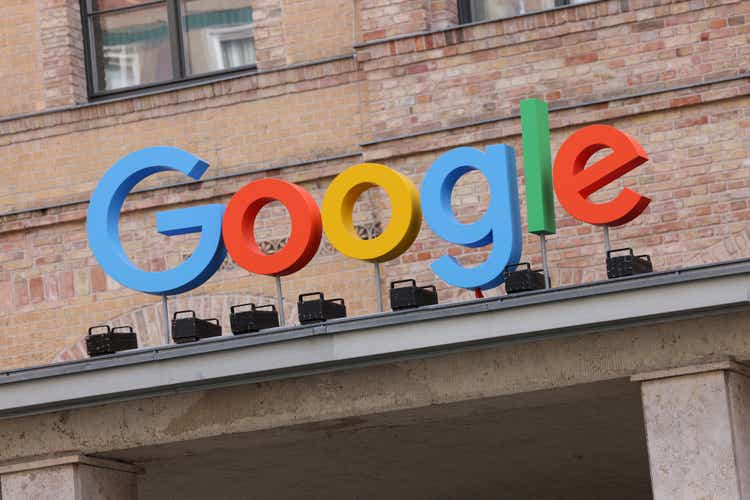
Sean Gallup
Sean Gallup
Just a few years ago, we were in the race for which company will first reach a trillion-dollar market cap. Now we have multiple trillion-dollar companies. It is no surprise that the trillion-dollar club is dominated by U.S. tech giants of the likes of Apple (AAPL), Microsoft (MSFT), Amazon (AMZN) and Alphabet (NASDAQ:GOOG) (NASDAQ:GOOGL). These tech giants have the following things in common; 1) they generate insane, mind-boggling, amounts of cash flows from operating activities and 2) they have rock-solid balance sheets, flooded with cash. Alphabet, Google’s parent, is arguably the cheapest out of the aforementioned tech companies (more on this below).
First off, it is important to highlight the stability of Alphabet’s results, especially since we are going through very turbulent times, with sky-high inflation, aggressive interest rate hikes, COVID-19, and geopolitics tensions, including the war in Ukraine and escalation between China and Taiwan, among other things. Alphabet, recently announced solid Q2 2022 results. Revenues came in at $69.7 billion, up 13% versus last year. That said, results slightly missed estimates and this was the slowest quarterly growth in two years. It is clear that the tailwinds enjoyed by big tech companies during the pandemic are no longer here. Despite the slowdown, Alphabet remains extremely profitable. Net income was $16 billion for the period, or $1.21 per share, a 14% decrease from last year ($18.53 billion or $1.27 per share). Performance was primarily driven by Search and Cloud. As Sundar Pichai, CEO of Alphabet and Google, commented:
In the second quarter our performance was driven by Search and Cloud. The investments we’ve made over the years in AI and computing are helping to make our services particularly valuable for consumers, and highly effective for businesses of all sizes. As we sharpen our focus, we’ll continue to invest responsibly in deep computer science for the long-term.
As the saying goes, “cash is king”. So far this year, Alphabet is demonstrating tremendous resilience on the two important metrics that really matter, namely 1) net cash provided by operating activities and 2) cash & cash equivalents. Specifically:
The fact that Alphabet does not pay a regular dividend, unlike Microsoft and Apple, provides additional financial flexibility. Dividends paid by blue-chip companies are usually fixed and progressive in nature, meaning it’s a constant cash outflow out of the door. Instead, Alphabet’s shareholders are compensated in the form of share repurchases, which is a more flexible arrangement. As such, if Alphabet decides that it wants to hoard cash, for whatever reason (e.g. to acquire another company), it can be done in a heartbeat, effectively following a ‘light switch’ approach i.e. by scaling down on buybacks, or cutting down on R&D (Research and Development). In any event, generating ~$95 billion annually in operating cash flow (which is essentially a recurring event every year – a gift that keeps on giving) and having ~$125 billion cash on hand, that can be increased by following the ‘light switch’ approach, as discussed above, essentially means that Alphabet can do whatever it pleases.
As mentioned above, Alphabet is arguably the cheapest out of the aforementioned tech companies, at least in terms of cash from operations relative to the market cap, which in my view is the most telling metric. As illustrated in the graph below, prior to 2010, Alphabet started from a lower base in terms of cash from operations compared to Apple and Microsoft, but is catching up at an impressive rate, and, if this pace continues, it will soon dominate the landscape.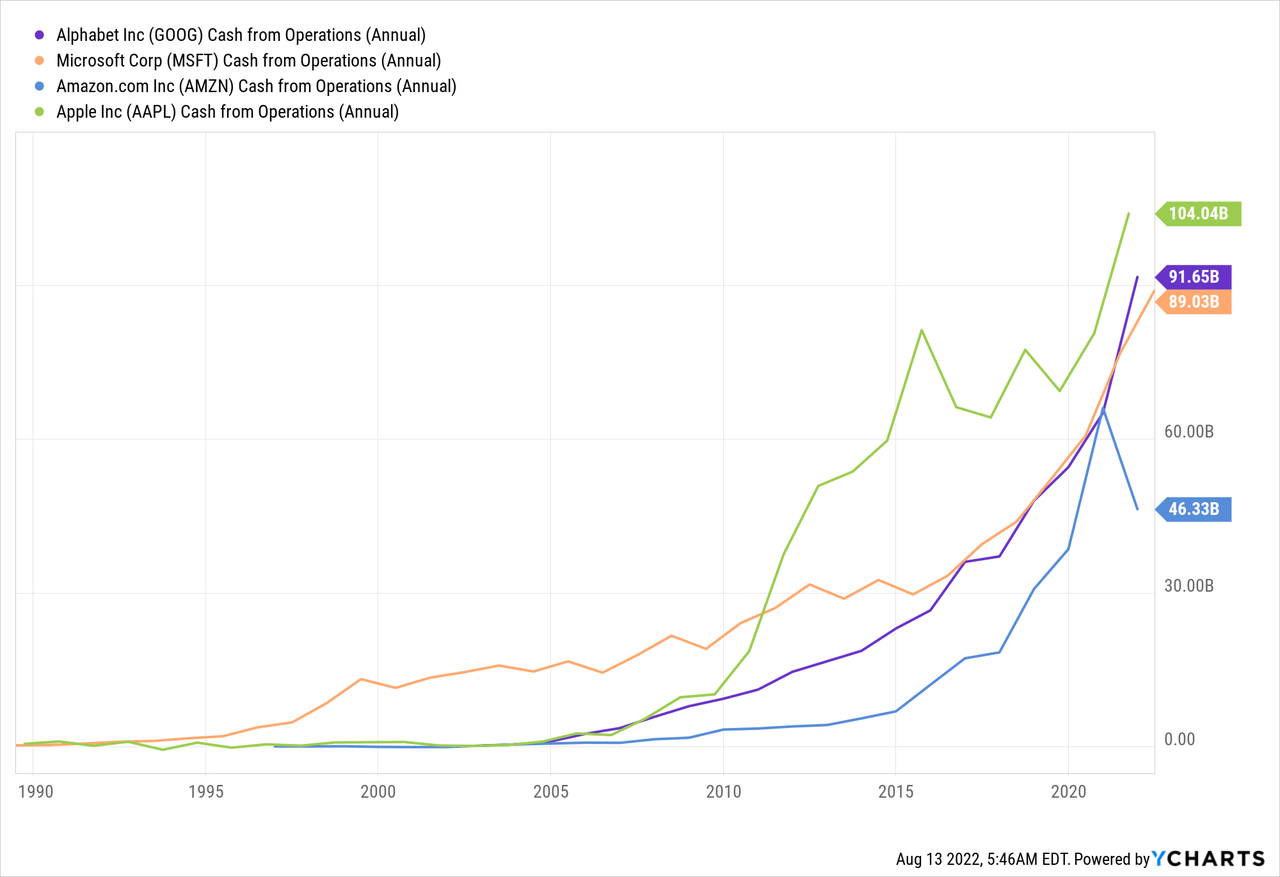
Alphabet surpassed Microsoft in 2021 and is now flirting with the top spot, currently enjoyed by Apple, which generates more than $100 billion in operating cash flow. My bet is that Alphabet will continue enjoying above-average growth rates compared to peers, all else constant, and will comfortably surpass the $100 billion mark, aided by Google’s dominant search engine and a wide range of other popular services, including Gmail, Chrome web browser, Google Maps, YouTube and Android software for smartphones.
What’s more, in terms of balance sheet strength, Alphabet ranks top of the list in terms of Cash and Short Term Investments (i.e. marketable securities). 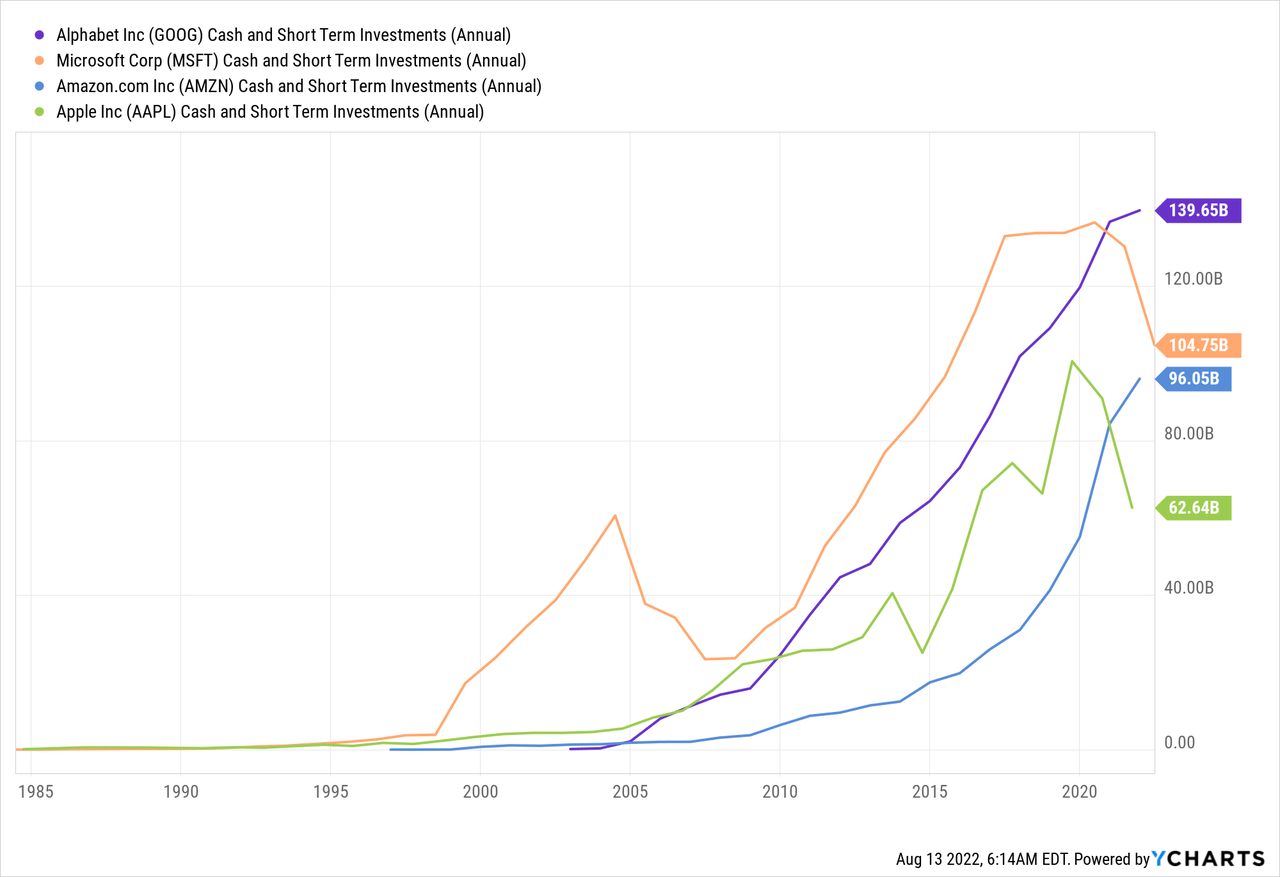
That said, it is important to note that we are not comparing Apples with Apples. Apple classifies more than ~$130 billion in marketable securities as Long Term Investments (non-current assets). So, to be fair, one needs to add this figure to Apple’s total cash balance, as these are liquid assets, meaning that Apple actually surpasses Alphabet on this front, registering almost $200 billion in cash and marketable securities. However, in terms of Total Long Term Debt, Apple is leading the pack by a wide margin, with almost ~$125 billion in debt – which essentially offsets the ~$130 billion in marketable securities classified as long term investments.
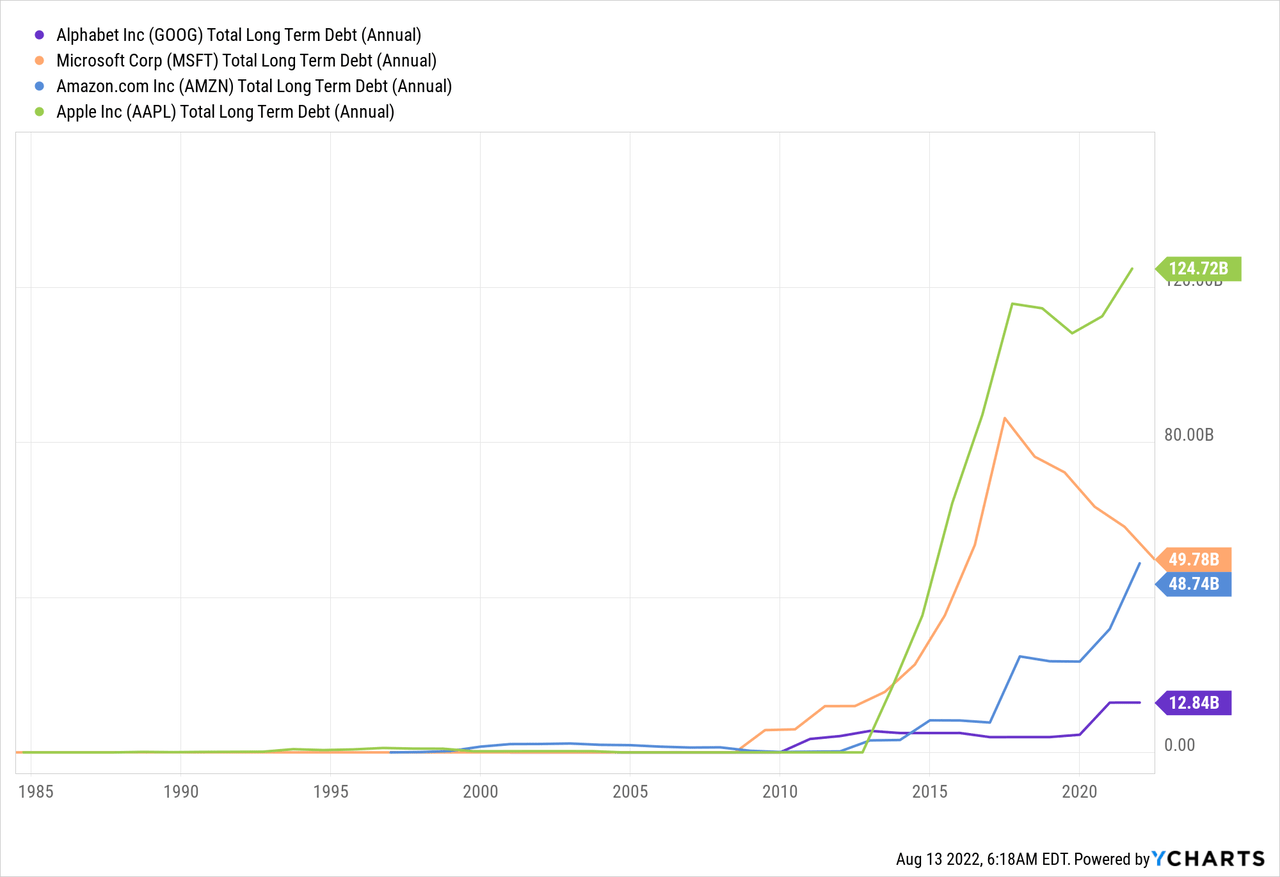
Of particular interest, Alphabet has the lowest total debt, by far. In other words, when also taking into account its cash & cash equivalent position, Alphabet objectively has the strongest balance sheet. In fact, Alphabet is the only tech giant where Cash & Short Term Investments outweighs all liabilities (i.e. not just total short- and long-term debt but also accounts payable, deferred revenue, accrued expenses, operating lease liabilities, etc).
In short, Alphabet has the strongest balance sheet and is generating almost as much cash from operations as Apple (having recently surpassed Microsoft, and has left behind Amazon by a wide margin). And, when talking into account Alphabet’s growth prospects from its world-class products, one would expect Alphabet’s market cap to be leading the way, or at least being comparable with Apple and Microsoft. However, this is not the case. Not even close.
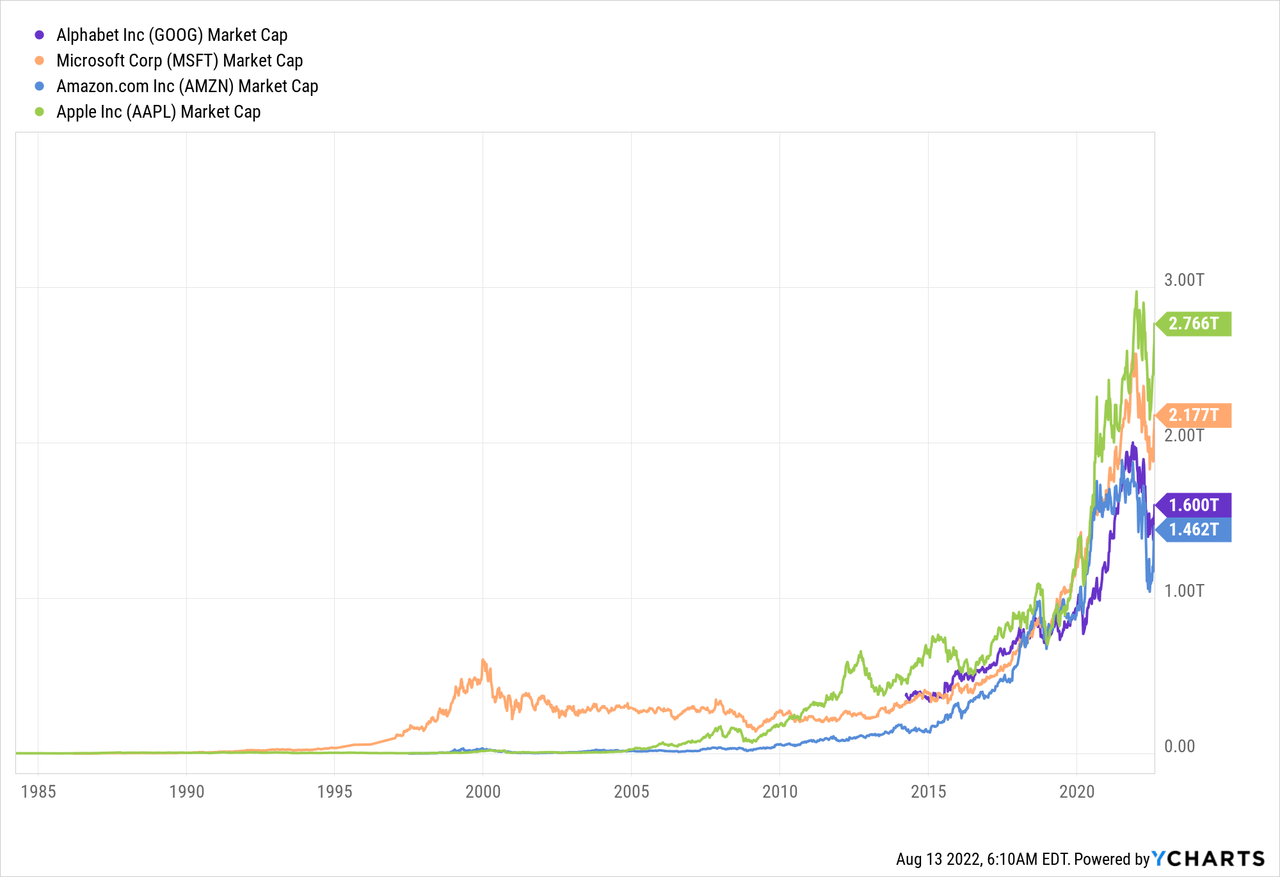
Paradoxically, Alphabet’s market cap is similar with Amazon, $1 trillion lower than Apple and almost $600 billion lower than Microsoft. And, as mentioned above, Alphabet has the strongest balance sheet and is generating more cash from operations than Microsoft, and almost as much as Apple. This is a ‘head scratcher’ and I can only conclude that the market is either sleeping or assumes that Alphabet will struggle to grow into the future. But Alphabet is not a company that is staying put. It will invest ~$25 billion in R&D for FY 2022 (not this is already taken into account in the operating cash flow metrics). That’s a lot of money for annual R&D and, based on probabilities, something will eventually pay off. Moreover, out of the ~$95 billion in operating cash flow, around $25 billion will go for ‘purchases of property and equipment’, which includes both growth and maintenance CAPEX. As such, the remaining ~$70 billion is essentially free cash flow. That’s a lot of money, and as mentioned above, this is a recurring element (i.e. it reoccurs every year), albeit it with some swings.
It is important to stress that the resilience in Alphabet’s operating cash flow, and ability to hoard cash, is not a recent phenomenon. In fact, this has been the case for more than a decade. In addition to the graphs above, I am including the following bar charts to better demonstrate this phenomenon.
Alphabet’s Annual Cash from Operations:

Seeking Alpha
Seeking Alpha
In 2012, annual cash from operations was a ‘mere’ $16.7 billion. In 2019, it surpassed the $50 billion mark, in 2021 it surpassed $90 billion, and on a TTM period it is $95 billion. In other words, annual operating cash flow has increased more than 5 times since 2012, and we are now flirting with the $100 billion mark. This is a remarkable achievement for a company of this size. In comparison, Apple has ‘only’ managed to double cash from operations over the past decade. Moreover, Alphabet’s cash balance is also following a similar pattern.
Alphabet’s Total Cash & Short Term Investments:

Seeking Alpha
Seeking Alpha
In 2012, the cash balance (including marketable securities) was under $50 billion, and, as per the latest earnings report, it is now more than $120 billion. In other words, Alphabet is in an extremely strong position and is able to survive in any type of environment.
I always like to stress test my investments, with the aim of being as prudent as possible. Let’s entertain the market’s pessimistic view that Alphabet will not grow at all over the next few years. To this end, I assume the following scenario:
In this scenario, over a 10-year period, Alphabet will accumulate more than $750 billion in cash, which is approximately 50% of its current market cap. This provides a tremendous margin of safety, but it is also way too pessimistic and extreme of a scenario, in my view. In reality, Alphabet will innovate, grow as a business, either organically or by acquiring other companies, buy back shares, and eventually the EPS will be much higher than current levels. Patient, long term investors stand to benefit tremendously. Unless Alphabet’s products such as Google, Gmail, Google Maps, etc become obsolete. What are the odds? Extremely low in my opinion.
This article was written by
Disclosure: I/we have a beneficial long position in the shares of GOOG either through stock ownership, options, or other derivatives. I wrote this article myself, and it expresses my own opinions. I am not receiving compensation for it (other than from Seeking Alpha). I have no business relationship with any company whose stock is mentioned in this article.